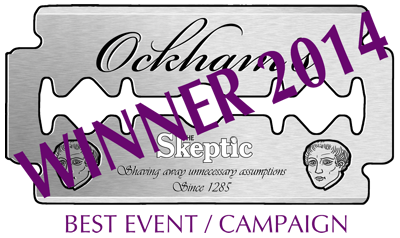Focus of the Month — April 2011: craniosacral therapy (CST)
01 April 2011
Our first Focus of the Month has been a remarkable success and thanks to everyone who has supported our focus on homeopathy by submitting complaints to the ASA and particularly to those who've let us know about the complaints they submitted. (We regret that because of a server problem for a day or so last week, not all of these received acknowledgement but rest assured they were all received and recorded by us.)We believe that we've done enough for the time being to ensure that homeopaths nationwide are being alerted to the requirement to comply with the ASA's Code of Advertising Practice. The ASA have told complainants that a further three month grace period is being allowed to practitioners to remove misleading claims from their websites (see previous news for further details).
It is encouraging that the ASA are telling advertisers of homeopathy that:
We have seen the most recent, authoritative and comprehensive review of the scientific evidence by the House of Commons Science and Technology Committee entitled “Evidence Check 2: Homeopathy”. This provided an analysis of evidence and opinion submitted by a range of proponents and opponents of homeopathy, including some of the organisations representing homeopathy in the UK and practising homeopaths. The conclusion made clear that there was a lack of objective scientific evidence to substantiate the efficacy of homeopathy. Because the documents submitted for the “Evidence Check 2: Homeopathy” report provided a comprehensive collection of data for assessment, and homeopaths and the various bodies that represent them were invited to submit evidence as part of a consultation process, we do not intend to duplicate that process or assess the evidence again. We know that some studies suggest a positive effect from homeopathy; however, we understand that the evidence, when taken as a whole, does not support the conclusion that homeopathy in and of itself is proven to help or treat health conditions.
The ASA told all the complainants that they believed the best way to achieve industry-wide compliance — something the ASA has considerable experience in doing — was to work with the various trade bodies. They said:
We will however publish specific, up-to-date advice to the industry and its representative bodies in due course and we will work with them to ensure that advertising for homeopathy is compliant with the Code.
We believe this is the right approach. While there are many practitioners who will not be members of a trade body, the message will be heard by a large number of them and will undoubtedly spread to others.
We think the most efficient way forward is not to send any more complaints about homeopathy to the ASA at present but to give them time to complete their ongoing investigations and compliance monitoring.
April 2011: craniosacral therapy (CST)
So, for our new focus of the month — craniosacral therapy — we'd like to try a different approach.
Instead of submitting complaints directly to the ASA, we'd like you to gather the information about CST websites and send it to us so we can submit 'test' cases to the ASA.
![]() To find out how you can help, click here.
To find out how you can help, click here.
![]() To find out more about craniosacral therapy, click here.
To find out more about craniosacral therapy, click here.
Latest news
- "Undisputable evidence of scientific misconduct" by homeopaths
- Yet another bad year for homeopathy
- Nelsons Homeopathic Pharmacy #3
- Nelsons Homeopathic Pharmacy #2
- The Society of Homeopaths: failing to make the case for homeopathy
- The end of homeopathy on the NHS in Bristol?
- NHS Homeopathy: 20 years of decline
- The different faces of the Society of Homeopaths
- The growing pains of osteopaths
- Diluting misleading claims - ASA update
Most read
- Finding deleted and changed webpages
- About The Nightingale Collaboration
- How to find out who owns a website
- Advertising Standards Authority
- Rubbing salts into the wounds of homeopathy
- How to submit a complaint to the ASA
- The decline of homeopathy on the NHS
- Landmark decisions for homeopaths
- NHS Lanarkshire to end referrals to Glasgow Homeopathic Hospital
- Making a complaint
